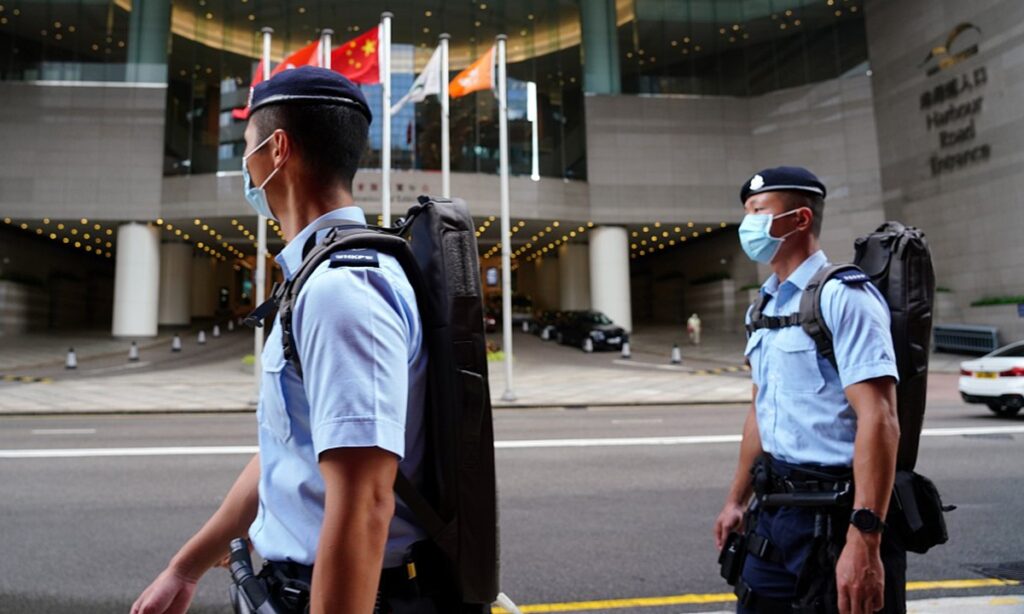The Hong Kong Police Force (HKPF)’s Inter-departmental Counter Terrorism Unit launched a citywide campaign on Tuesday encouraging taxi drivers to report suspicious messages related to terrorism and violence. If they successfully assist in solving a case and securing a conviction, they may receive a reward.
The campaign was initiated following an incident in March in which a taxi driver assisted in the arrest of two individuals convicted of planning a bomb attack in a taxi. The driver received the first anti-terrorism reward, according to local media reports.
With over 18,000 taxis and about 46,000 active taxi drivers in Hong Kong, suspicious behavior and items should be reported, the police’s counterterrorism unit said. If the situation is not urgent, drivers should first consider their own safety and report it under safe conditions. In the event of an emergency, they should immediately dial 999.
The incentive for reporting counterterrorism tips and a hotline for submitting non-urgent leads related to potential terrorist activities were established in June 2022. This was done with the intention of motivating citizens to come forward with information about suspicious individuals, objects, or events.
Senior Superintendent Peter Leung Wai-ki, head of the Inter-departmental Counter Terrorism Unit, was quoted as saying in media reports that in recent months, the police have received numerous reports from vigilant taxi drivers, successfully thwarting two gang fights and arresting seven suspects, and also aiding in the arrest of a drug trafficking suspect.
While the risk of terrorist attacks in Hong Kong remains moderate, there are still individuals with extreme violent intentions, Leung said. “If we wait until a terrorist attack occurs, it’s too late. The most effective way to prevent violent incidents is for citizens to notice suspicious activities in their daily lives,” he added.
The police officer also cited an example from Liverpool, UK, in 2021 where a taxi driver became suspicious of a passenger and locked him inside the car. The man detonated a bomb on himself, effectively preventing large-scale deaths and injury.
Sonia Man Yee Cheng, president of Taxi Dealers & Owners Association of Hong Kong, said each taxi driver travels about 500 kilometers daily, acting like “small spotlights,” helping the community detect suspicious situations among passengers and preventing crimes through alerting the police.
The taxi industry will launch more activities to educate professional drivers about anti-terrorism and anti-violence information, such as when to raise their personal vigilance and how to provide information to the police. “The association is enthusiastic about this mission and wants to participate as soon as possible,” Cheng added.
“Every citizen can serve as a hero of the city,” said Chu Kar-kin, a veteran current affairs commentator based in Hong Kong and member of the Chinese Association of Hong Kong and Macao Studies.
Hong Kong is one of the safest cities in the world. The HKPF safeguards the community day and night. Nevertheless, we cannot disregard any potential hazard or risk to our security, Chu told the Global Times on Tuesday.
“Now, most of the vehicles are equipped with car cameras which may also serve as crucial evidence and exhibits for prosecution purposes and court procedures, which restores the value of mutual help and support across the community,” Chu noted.
Implementing this mechanism is undoubtedly an apt measure, aligning with the current situation in Hong Kong, allowing the vast majority of patriotic and Hong Kong-loving residents to work together to protect Hong Kong, Junior Police Officers’ Association Chairman Lam Chi-wai told the Global Times on Tuesday.
However, this mechanism is not a new concept, as it’s similar to the previously launched “snap a reckless driver,” anti-corruption hotline, anti-triad hotline, and anti-scam hotline, or specific hotlines established for particular incidents or crimes to allow citizens to provide information, Lam said. “The sole purpose of these measures is to combat crime through police-citizen cooperation, establishing a robust relationship between the police and the public.”
(Global Times)




